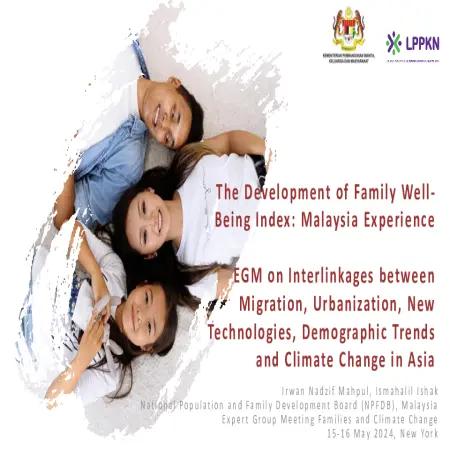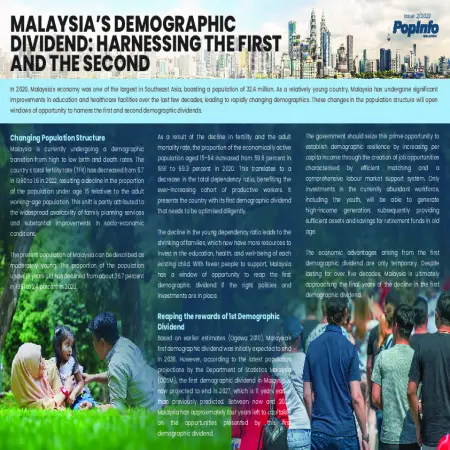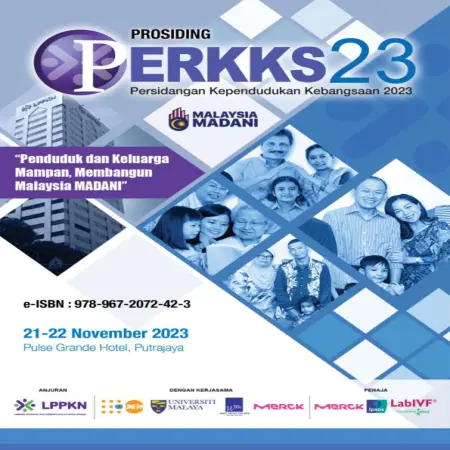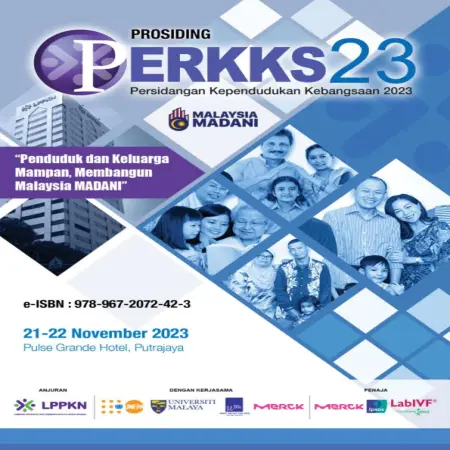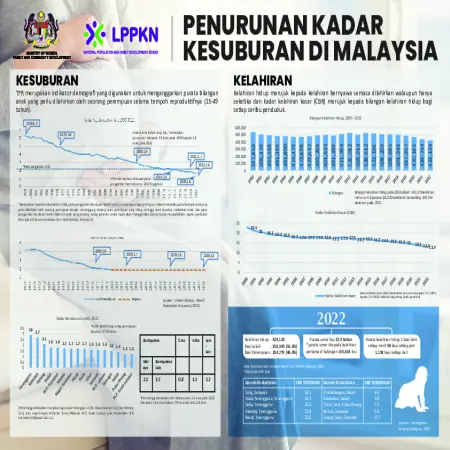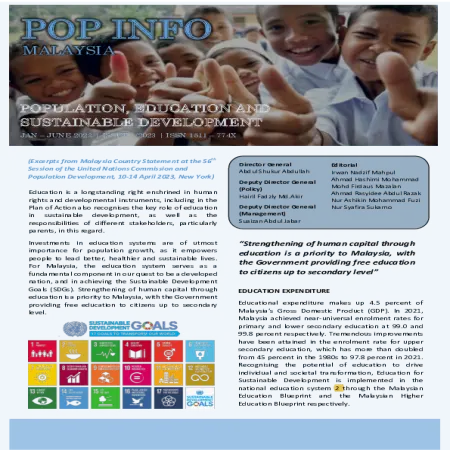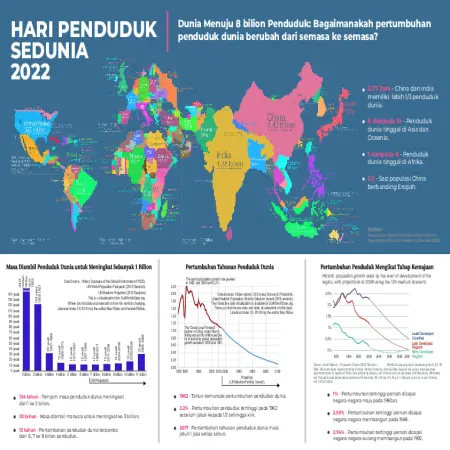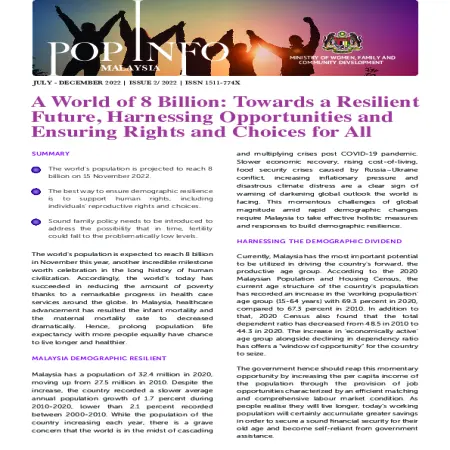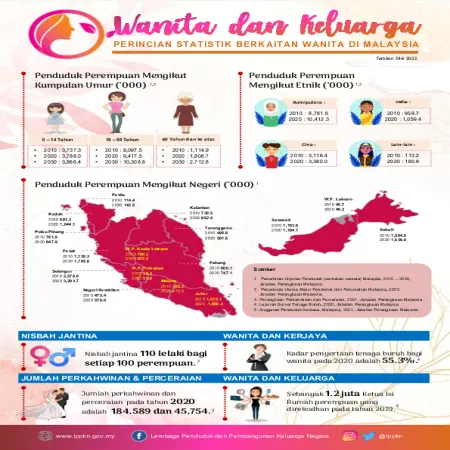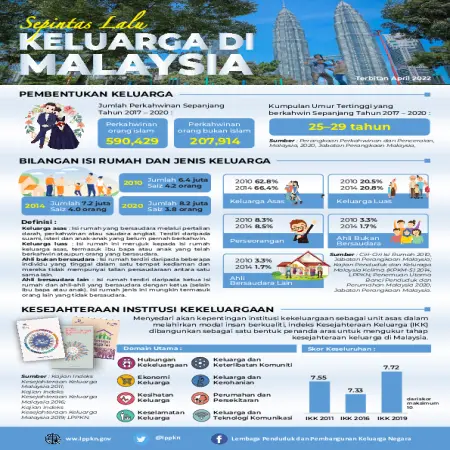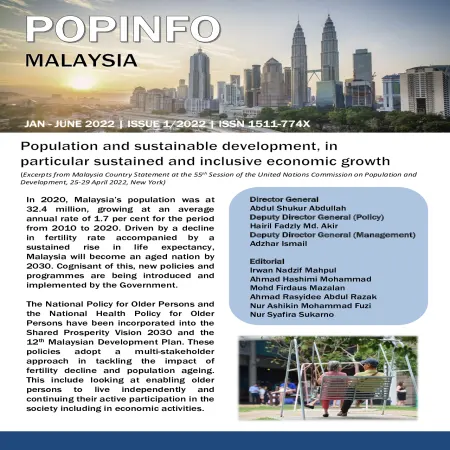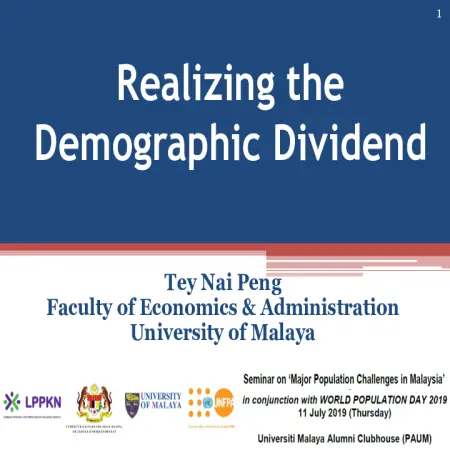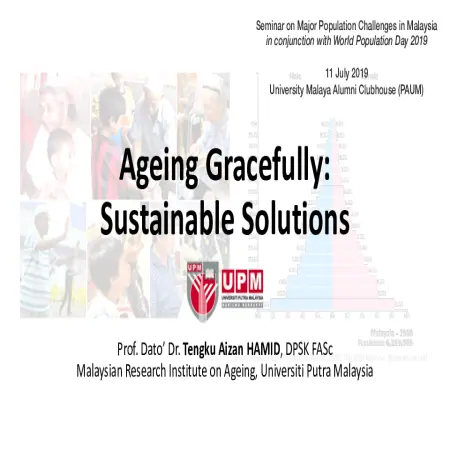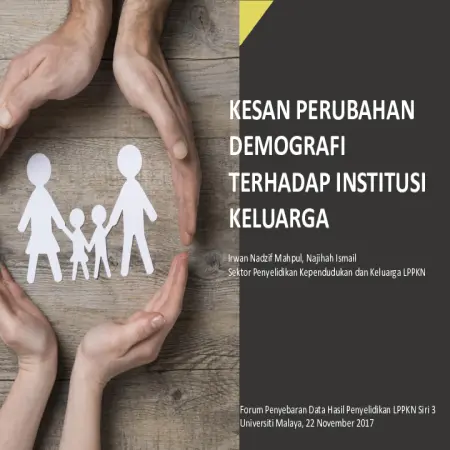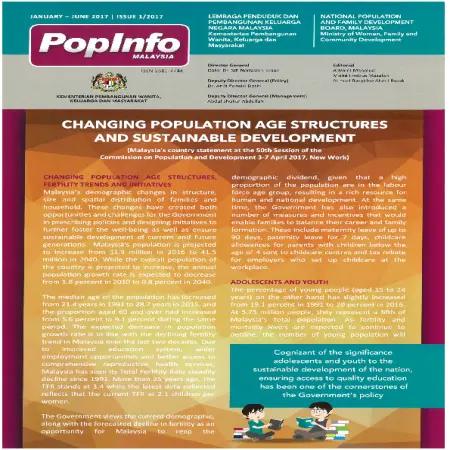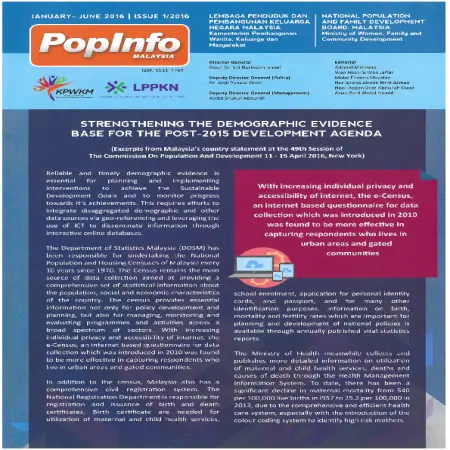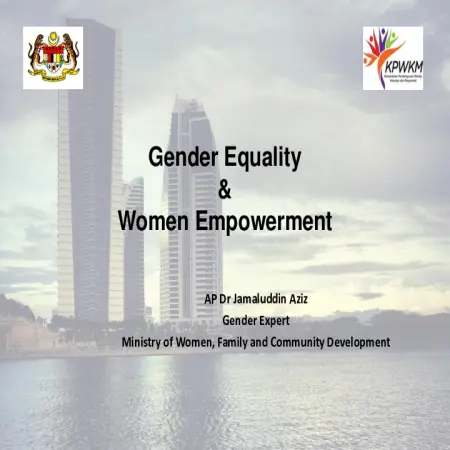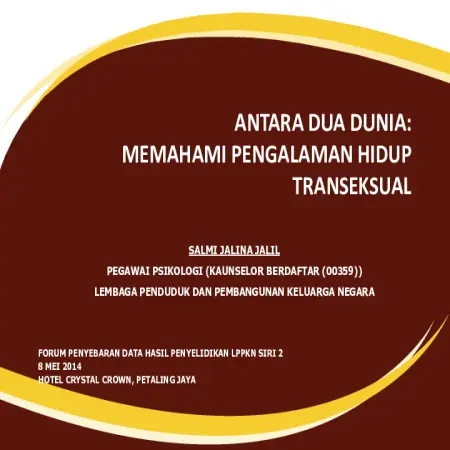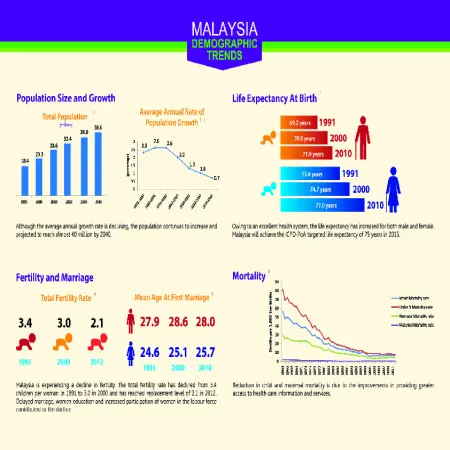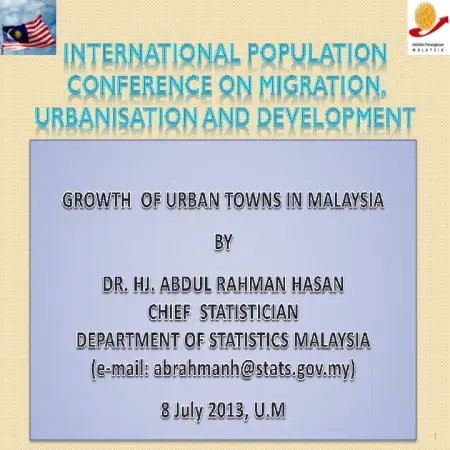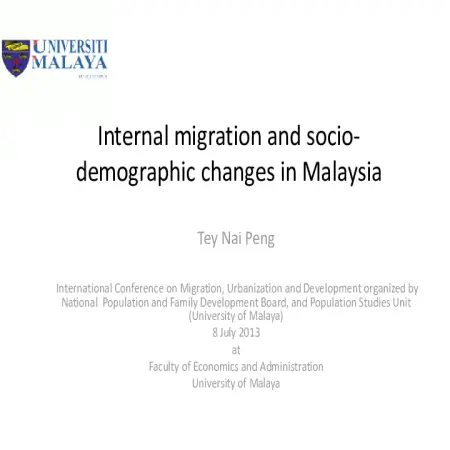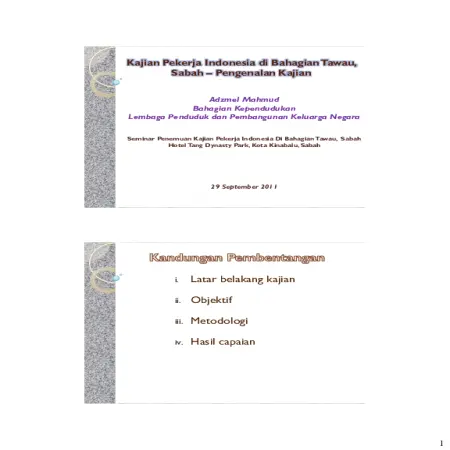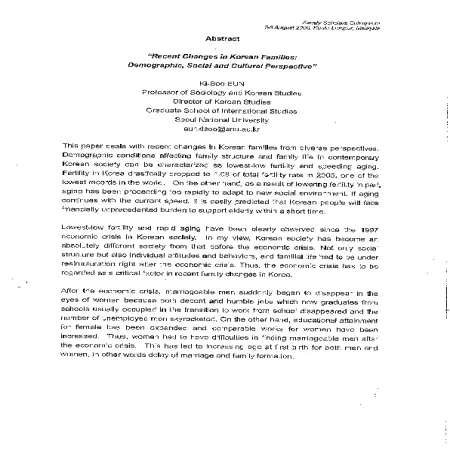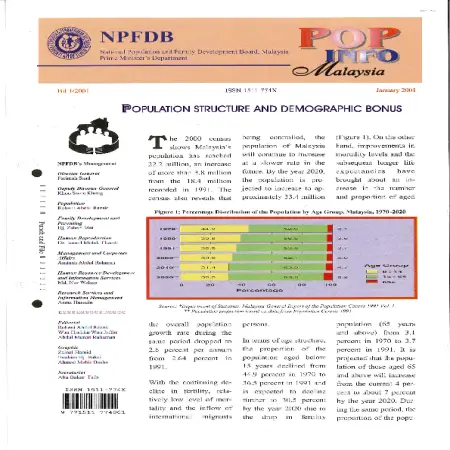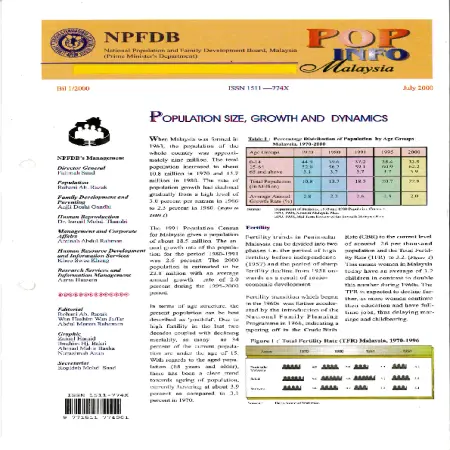TOPICS
Results for Topics : "Demography"
2024 (1)
|
|
The development of Family Well-Being Index: Malaysia experience. EGM on interlinkages between migration, urbanization, new technologies, demographic trends and climate change in Asia.
Item Type: Conference or Workshop Item
Editor:
Year: 00/05/2024
Abstract: The Malaysian Family Well-Being Index (MFWBI) was initiated in 2011 by the NPFDB with the aim to measure the levels of family well-being in the country and to recommend strategic initiatives to strengthen the implementation of future family intervention programs in Malaysia. In 2016, measurement of the MFWBI was repeated using an improvised instrument. The MFWBI 2016 had maintained all the 7 domain in the MFWBI 2011 and added one more domain, namely, Family and Communication Technology. The instrument’s refinement exercise was repeated again in 2019, and 2022 in order to measure the family well-being. The purpose of the refinement exercise was to ensure that the questionnaire was valid and relevant for current and near future use. The domain in the MFWBI are Family Relationship, Family Economy, Family Health, Family Safety, Family and Community Engagement, Role of Religion & Spiritual Practice, Housing and Environment, Family and Communication Technology. At the national level, the MFWBI has been recognized by the federal government as one of the national KPI in the country’s 5-year development planning (Eleventh Malaysia Plan, 2016 -2020 and Twelfth Malaysia Plan, 2012 – 2025).
|
|
|
|
2023 (5)
|
|
Malaysia's demographic dividend: harnessing the first and the second
Item Type: Newsletter
Editor:
Year: 00/12/2023
Abstract: In 2020, Malaysia's economy was one of the largest in Southeast Asia, boasting a population of 32.4 million. As a relatively young country, Malaysia has undergone significant improvements in education and healthcare facilities over the last few decades, leading to rapidly changing demographics. These changes in the population structure will open windows of opportunity to harness the first and second demographic dividends.
|
|
|
|
|
|
Prosiding Persidangan Kependudukan Kebangsaan 2023 (PERKKS 23): “Penduduk dan Keluarga Mampan, Membangun Malaysia MADANI”
Item Type: Book
Editor:
Year: 00/12/2023
Abstract: Collection of papers presented during the 2023 National Population Conference (PERKKS 23), 21-22 November 2023, Pulse Grande Hotel, Putrajaya.
|
|
|
|
|
|
Kesan peralihan demografi terhadap kebajikan sosial dan pasaran buruh: perbincangan kumpulan fokus
Item Type: Book Section
Editor:
Year: 00/12/2023
Abstract: Demographic transition refers to changes in the population structure of a country, mainly related to factors such as birth rate, mortality rate and life expectancy of the population. This study aims to identify the effects of demographic transition on social welfare and labour market conducted in Shah Alam, Selangor among heads of household.
|
|
|
|
|
|
Penurunan Kadar Kesuburan Di Malaysia
Item Type: Infographic
Editor:
Year: 00/10/2023
Abstract: Total Fertility rate (TFR) is a demographic indicator used to estimate the average number of children a woman should give birth to during her reproductive period. The findings of a poll in Sarawak found that the total TFR for the state of Sarawak is decreasing drastically. 12.6% of couples have had or are experiencing fertility problems and it is difficult to conceive within a year after marriage.
|
|
|
|
|
|
Population, education and sustainable developmet
Item Type: Newsletter
Editor:
Year: 00/06/2023
Abstract: Education is a longstanding right enshrined in human rights and developmental instruments, including in the Plan of Action also recognises the key role of education in sustainable development, as well as the responsibilities of different stakeholders, particularly parents, in this regard.
Strengthening of human capital through education is a priority to Malaysia, with the Government providing free education to citizens up to secondary level. Malaysia is also undertaking efforts to ensure that the education system is robust, resilient and fit for the future.
|
|
|
|
2022 (8)
|
|
Prosiding Persidangan Kependudukan Kebangsaan 2022 (PERKKS 22): “Pemerkasaan Penduduk dan Keluarga, Teras Negara Maju”
Item Type: Book
Editor:
Year: 00/12/2022
Abstract: Collection of papers presented during the 2022 National Population Conference (PERKKS 22), 10-11 November 2022, Bangi Resort Hotel, Selangor.
|
|
|
|
|
|
A world of 8 billion: Towards a resilient future, harnessing opportunities and ensuring rights and choices for all
Item Type: Newsletter
Editor:
Year: 00/11/2022
Abstract: The world's population is projected to reach 8 billion on 15 November 2022. The best way to ensure demographic resilience is to support human rights, including individuals' reproductive rights and choices.
|
|
|
|
|
|
Population and sustainable development, in particular sustained and inclusive economic growth
Item Type: Newsletter
Editor:
Year: 00/05/2022
Abstract: In 2020, Malaysia's population was at 32.4 million, growing at an average annual rate of 1.7 per cent for the period from 2010 to 2020. Driven by a decline in fertility rate accompanied by a sustained rise in life expectancy. Malaysia will become an aged nation by 2030.
|
|
|
|
|
|
The 55th session of the Commission on Population and Development United Nations, New York, 25-29 April 2022
Item Type: Country Statement
Editor:
Year: 00/04/2022
Abstract: Malaysia’s socio-economic development has been significant in transforming our economy from a low income to an upper-middle-income status. We have achieved significant progress in eradicating poverty and narrowing inequalities. However, the COVID-19 crisis has resulted in vulnerable households falling into poverty and hardship.
|
|
|
|
|
|
The socio-demographic factors affecting labour participation of older people in Malaysia: evidence from the fifth Malaysian population and family survey 2014 (MPFS-5)
Item Type: Book Section
Editor:
Year: 00/00/2022
Abstract: This study analyses the relationship between sociodemographic characteristics and labour participation among 4,059 older Malaysians (age 60+) using data from the Fifth Malaysian Population and Family Survey 2014 (MPFS-5). A binary logistic regression was used to identify the significant predictors of older Malaysians participating in the labour market after controlling for key demographic, health and socio-economic, geographical and intergenerational support variables.
|
|
|
|
2019 (2)
|
|
Realising the demographic dividend
Item Type: Conference or Workshop Item
Editor:
Year: 00/00/2019
Abstract: Malaysia has done well in harnessing the demographic dividend through pragmatic planning and management, and investment in health and education. It is ranked among the very high Human Development index country (from 63 to 57). Achieved almost all the goals of ICPD (1994-2014) and MDGs (2000-2015).
|
|
|
|
2018 (1)
2017 (2)
|
|
Kesan perubahan demografi terhadap institusi keluarga
Item Type: Conference or Workshop Item
Editor:
Year: 00/00/2017
Abstract: Since the 1980s, the fertility rate (TFR) has declined slowly from 4.0 to 2.0 children per woman in 2016. This means that every woman in the country at this point , on average, gives birth to 2 children in her lifetime. The rapid decline in fertility rate (TFR) has accelerated the aging process of the country. The TFR is likely to remain between 1.9 and 2.0 by 2020 and below 1.9 in the next decade. This presentation is about the impact of demographic change on family institutions.
|
|
|
|
|
|
Changing population age structures and sustainable development
Item Type: Newsletter
Editor:
Year: 00/00/2017
Abstract: Malaysia's demographic changes in structure, size and spatial distribution of families and household. These changes have created both opportunities and challenges for the Government in prescribing policies and designing initiatives to further foster the well-being as well as ensure sustainable development of current and future generations. Malaysia's population is projected to increase from 31.9 million in 2016 to 41.5 million in 2040. While the overall population of the country is projected to increase, the annual population growth rate is expected to decrease from 1.8 percent in 2010 to 0.8 percent in 2040.
|
|
|
|
2016 (2)
|
|
Strengthening the demographic evidence base for the post-2015 development agenda
Item Type: Newsletter
Editor:
Year: 01/07/2016
Abstract: In Malaysia, the implementation of the post-2015 development agenda has obtained the highest political commitment at the national level and has continuously involved multi-stakeholders engagement under the 11th Malaysia development plans (2016-2020). Malaysia will also further improve the availability of online interactive databases and access to geo-referenced datasets disaggregated by relevant characteristics such as income, gender, age, ethnicity and disability, to ensure that no one is left behind.
|
|
|
|
|
|
Gender equality and women empowerment
Item Type: Conference or Workshop Item
Editor:
Year: 00/00/2016
Abstract: The term gender equality is usually seen as synonymous with women’s empowerment. In Malaysia, the task of promoting gender equality as a vision and mission of the country’s development project has been shouldered by the Ministry of Women, Family and Community Development (henceforth KPWKM). Throughout the year, KPWKM has been focusing on empowering women in all areas of life, particularly in politics and economy. The formulation of the National Policy on Women and its ensuing Action Plan is the epitome of this effort. In addition, Gender Mainstreaming has been employed, albeit rather flighty, as KPWKM’s strategy to achieve gender equality. However, in contemporary Malaysian context, the link between gender equality and women’s empowerment has turned into a stigma that belies the importance of this development mission. This paper presentation seeks to address one of the reasons, that is, the dissemination of information about gender equality and women’s empowerment. I argue that the inconsistency and lack of strategy in the Ministry’s effort to strategically promote gender equality and women’s empowerment is a course for concern.
|
|
|
|
2014 (2)
|
|
Antara dua dunia: memahami pengalaman hidup transeksual
Item Type: Conference or Workshop Item
Editor:
Year: 00/00/2014
Abstract: This study aims to understand the life experiences of transexual people. Researchers used a semi -structured interview method to obtain the required information. A total of three (3) male to female transexual respondents in their 30s, 40s and 50s were involved in this study. The data obtained were analyzed based on topics and sub-topics. The main topics in this study are the life experiences of transexual and four (4) sub-topics in this study are the experiences of childhood and adolescence, relationships with family, employment and social life of transexual. The findings in this study are able to provide a clearer understanding of transexual people. In addition, these findings can be considered by parties who are directly or indirectly involved with transexual people in implementing policies, interventions, programs and even counseling. This study is also a pioneer to other studies involving transexual people, especially studies involving parents who have children who have a tendency to transexual identity.
|
|
|
|
2013 (2)
|
|
Growth of urban towns in Malaysia
Item Type: Conference or Workshop Item
Editor:
Year: 00/00/2013
Abstract: Malaysia has experienced an outstanding growth of urban towns since its formation in 1963. The shift from agricultural to an industrial based economy has inevitably led to rapid physical, social and economic changes. The impact of urban spatial transformation accentuated the growth in the number of urban towns with urban centres increasing in size and expansion of major towns outwards to sprawl into peripheries. This paper highlights the growth of urban towns in Malaysia based on the data available from the 1970, 1980, 1991, 2000 and 2010 Population and Housing Censuses. The data reveals a surge of growth in number from 72 towns in 1980 to 228 towns in 2010. The increase in the growth of urban centres and the urbanization process is the result of spatial transformation, demographic phenomenon and various government measures for a measureable balanced development.
|
|
|
|
|
|
Internal migration and socio-demographic changes in Malaysia
Item Type: Conference or Workshop Item
Editor:
Year: 00/00/2013
Abstract: This paper re-examines the levels, trends and patterns of internal migration, followed by some discussions on the causes and consequences of internal migration in Malaysia in 1991 and 2000. A more up to date analysis awaits the release of migration data from the 2010 census. The focus of this paper is on inter-state and inter-regional rather than intra-state migration as more people moved across states than within state. Key questions to be addressed include the reasons for the high concentration of migration in the Klang Valley since the 1970s, migration selectivity in terms of age, education and ethnicity. The migration impact on socio-demographic changes and policy issues will also be examined.
|
|
|
|
2011 (2)
|
|
Customer retention: a case study of LPPKN clinics
Item Type: Thesis
Editor:
Year: 00/00/2011
Abstract: This is a descriptive study intended to identify the main factors which contribute to the customer retention among the “Clinical Clients” of National Population and Family Development Board or “Lembaga Penduduk dan Pembangunan Keluarga Negara”
(LPPKN). The study focused on three variables to check on the level of influence, affect and effect to the process of customer retention. Those variables are service branding, perceived value and service quality. The study was also covered the impact and
influence of the demographic element to the service branding, perceived value and service quality in the process of customer retention. Health service sector is getting very important and competitive. This is highly true among the health clinics which are providing reproductive health services. Understanding and fulfilling the customers’ need will contribute to retaining existing customers and reduce the customer switching intentions. Through this research, we were able get some insights of factors and the ranking of importance of these factors in the process of customer retention. For the purpose of this study I have chosen LPPKN Clinics (Semi-Government) in Klang Valley and Seremban. The finding shows there is a positive relationship between perceived value and service quality with customer retention. Nevertheless relationship between service branding and customer retention is not supported for the LPPKN clinical setting. Analysis on the demographic factor showed that, it has a significant influence in regard to service branding, perceived value, service quality and customer retention.
|
|
|
|
|
|
Kajian pekerja Indonesia di Bahagian Tawau, Sabah: pengenalan kajian
Item Type: Conference or Workshop Item
Editor:
Year: 00/00/2011
Abstract: The objective of this study is to identify the causal factors of entry and conduct socio-demographic analysis such as family, education, health, family planning practices, citizenship and socialization of Indonesian immigrants. The next objective is to study the perception of dependence on Indonesian workers as well as the impact of the presence of immigrants/Indonesian workers on the local population in terms of economy, security, family, culture, education, health, social and legal. The last objective is to identify the factors of hiring foreign workers, the process and costs of hiring, wages and employment, and the facilities provided by employers to foreign workers.
|
|
|
|
2010 (1)
|
|
Parenting@Work module
Item Type: Module
Editor:
Year: 00/00/2010
Abstract: The National Population and Family Development Board (NPFDB) has developed a Parenting@Work courses designed to help dual career families cope with the multiple demands of work and family life. Through the Parenting@Work courses, you will have the opportunity to learn the skills and techniques of balancing family and work, time management as well as gain valuable parenting knowledge and skills to make you a better parent. You are urged to utilize the opportunity provided by NPFDB to enhance your knowledge and skills in facing contemporary family challenges.
|
|
|
|
2006 (1)
|
|
Recent changes in Korean families: demographic, social and cultural perspective
Item Type: Conference or Workshop Item
Editor:
Year: 00/00/2006
Abstract: This paper deals with recent changes in Korean families from diverse perspectives. Demographic conditions affecting family structure and family life in contemporary Korean society can be characterized as lowest-low fertility and speeding aging. Fertility in Korea drastically dropped to 1.08 of total fertility rate in 2005, one of the lowest records in the world. On the other hand, as a result of lowering fertility in part, aging has been proceeding too rapidly to adapt to new social environment. If aging continues with the current speed, it is easily predicted that Korean people will face financially unprecedented burden to support elderly within a short time. Lowest-low fertility and rapid aging have been clearly observed since the 1997 economic crisis in Korean society. In my view, Korean society has become an absolutely different society from that before the economic crisis. Not only social structure but also individual attitudes and behaviors and familial life had to be under restructuration right after the economic crisis. Thus, the economic crisis has to be regarded as a critical factor in recent family changes in Korea. Educational attainment for female has been expanded and comparable works for women have been increased. Thus, women had to have difficulties in finding marriageable men after the economic crisis. This has led to increasing age at first birth for both men and women, in other word delay marriage and family formation. Korean family has shown several new features in the late 1990s and early 2000s. One is the decreasing family formation. Another is increasing remarriage in Korea. Remarriage, in particular women's remarriage was negatively stigmatized according to a Confucian legacy to prohibit women's remarriage in traditional times. This custom has been remained for a long time. However, increasing divorce not only at younger ages but at middle and older ages has widened the possibility of remarriage for both men and women. Tolerance toward remarriage at the societal level has also greatly increased according to various family surveys. Even first-time marriage by men has been made with divorced or bereaved women. Another feature in contemporary marriage in Korea is a soaring international or interracial marriage, especially for Korean men. Single men in rural area have had so many difficulties in finding marriage partner because Korean women would not like to marry farmers or men residing in rural area. Under the shortage of marriageable women, rural men began to seek foreign bride, firstly from China and then Vietnam these day. Thus, more than one to ten marriages are now an interracial marriage in Korea. Changing demographic and familial conditions results in small size of family in Korea. The average number of household members is now less than three. On the other hand, one-person household is remarkably increasing in both urban and rural areas because of increasing divorce, deepening aging and increasing number of the female bereaved, and wide pursuit of independent life by younger generation. Also, with this trend, the proportion of female head of household is steadily increasing. However, female household heads are more suffering from poverty than male counterparts because of sex-discriminatory labor market, lack of women-friendly welfare policy and dual burden by the traditional patriarchal family system.
|
|
|
|
2001 (1)
|
|
Population structure and demographic bonus
Item Type: Newsletter
Editor:
Year: 00/01/2001
Abstract: Malaysia, like several other countries in the region, will benefit from the demographic change whereby the proportion of working age group has been increasing from 52 percent in 1970 to 58 percent in 1995. Currently, this group constitutes about 60 % and assuming fertility continues to decline as projected, this proportion will continue to increase, and will reach almost 64 % by the year 2020.
|
|
|
|
2000 (1)
|
|
Population size, growth and dynamics
Item Type: Newsletter
Editor:
Year: 00/07/2000
Abstract: When Malaysia was formed in 1963, the population of the whole country was approximately 9 million. The total population increased to about 10.8 million in 1970 and 13.7 million in 1980. The rate of population growth had declined gradually from a high level of 3.0 per cent per annum in 1966 to 2.3 per cent in 1980. Besides, with the continuing decline in fertility, relatively low level of mortality and inflow of international migrants being controlled, the population of Malaysia will continue to increase at a slower rate in the future.
|
|
|
|





